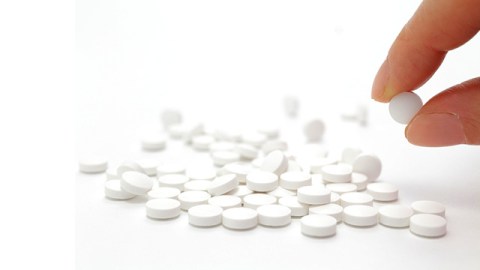Aspirin for Cancer Prevention

Even as the U.S. government continues to spend huge sums of money underwriting cancer research, public health agencies are failing to make people aware of a proven, well-tolerated, low-cost anti-cancer drug: aspirin.
Substantial research over the last 20 or more years has built a very solid scientific case for the proposition that to reduce your odds of getting a wide variety of cancers, you need only take small daily prophylactic doses of non-steroid anti-inflammatory drugs (NSAIDs), the best-known of which are aspirin and ibuprofen. (Note that acetominophen is an analgesic without the same anti-inflammatory properties as NSAIDs and has not been shown to reduce cancer.)
Scientists have known for the better part of a century that inflammatory processes are involved in carcinogenesis. NSAIDs appear to act via inhibition of prostaglandin synthesis through blockade of the enzyme cyclooxygenase-2 (aka COX-2), which is often overexpressed in cancers, and possibly through enhancement of apoptosis.
Regardless of how they act, there’s no arguing with the clinical data. Harris et al. reported in 2005 (in Oncology Reports) the results of an extensive meta-analysis of 91 epidemiological studies involving aspirin, ibuprofen, and other NSAIDs. Said the authors:
Daily intake of NSAIDs, primarily aspirin, produced risk reductions of 63% for colon, 39% for breast, 36% for lung, and 39% for prostate cancer. Significant risk reductions were also observed for esophageal (73%), stomach (62%), and ovarian cancer (47%). NSAID effects became apparent after five or more years of use and were stronger with longer duration. Observed protective effects were also consistently stronger for gastrointestinal malignancies (esophagus, stomach, and colon). Results for pancreatic, urinary bladder, and renal cancer were inconsistent. Initial epidemiologic studies of malignant melanoma, Hodgkin’s disease, and adult leukemia also found that NSAIDs are protective. A few studies suggest that ibuprofen has stronger anticancer effects than aspirin, particularly against breast and lung cancer.
A 2010 study by Brasky et al. in Cancer Causes & Control found “Recent aspirin use was inversely associated with breast cancer risk.” The risk reduction was on the order of 20% (even higher in women with a lifetime history of regular aspirin use).
A 2001 meta-analysis by Khuder and Mutgi in the British Journal of Cancer found NSAID usage was associated with either a 13% or a 22% reduction in breast cancer risk depending on the type of studies surveyed.
A 2012 case-control study by Lo-Ciganic et al. in Epidemiology found that daily aspirin use was associated with a 28% lower risk of ovarian cancer.
Daily NSAID use was found to correlate with a 28% reduction in mortality due to colorectal cancer in postmenopausal women, in the 2012 study by Coghill et al. published in Cancer Epidemiology, Biomarkers & Prevention.
With all this data available, you’d think the makers of aspirin and ibuprofen would be touting anti-cancer benefits of their products (which they can legally do, given the extensive nature of the scientific evidence), and you’d think the Food and Drug Administration, the Centers for Disease Control, and other agencies charged with promoting public health would be quick to spread the word. Not so, however. There’s too much money to be made treating cancer, after it takes root. For example, Pfizer subsidiary Wyeth Pharmaceuticals (makers of Advil) also sells the anti-cancer drug Torisel, which, at $76,000 per gram is several times more expensive than plutonium. Likewise, Bayer makes anti-cancer drug Nexavar, which costs $69,000 for a year of treatment. With these and other exorbitantly priced drugs at risk, there is no incentive for the Bayers or Pfizers of the world to undercut future profits by telling people about the anti-cancer benefits of cheap over-the-counter NSAIDs.
That’s why I urge you to tell everyone you know to read the literature on the risks (such as tinnitus and gastrointestinal bleeding) and benefits (cancer prevention) of NSAIDs, and decide: Is it better to spend ten cents a day on aspirin and/or ibuprofen, or is it better to wait and have to buy the plutonium-priced “medicines” that may or may not cure your cancer, but are sure to leave you penniless when and if you do die?
To me, the answer is pretty obvious.





